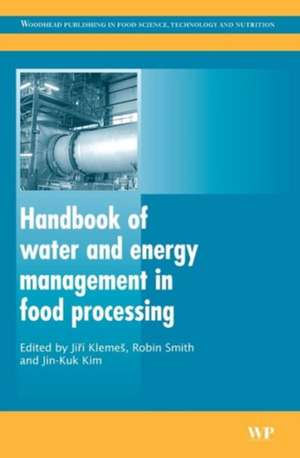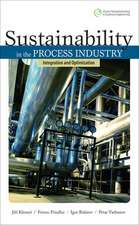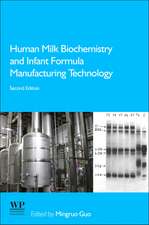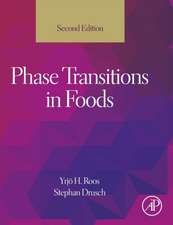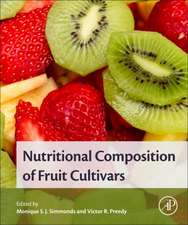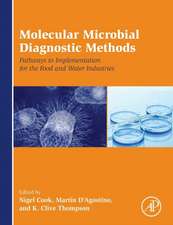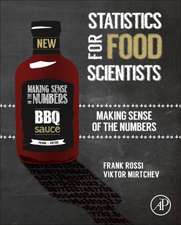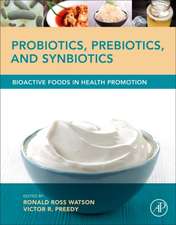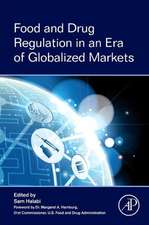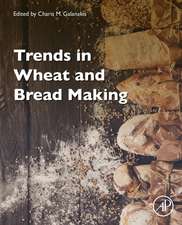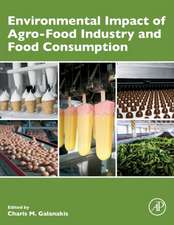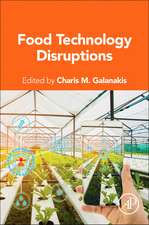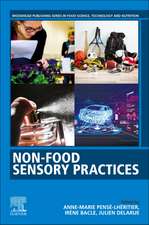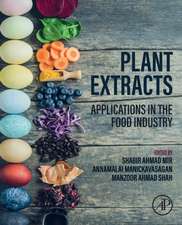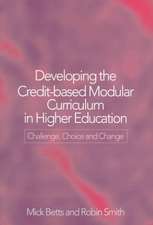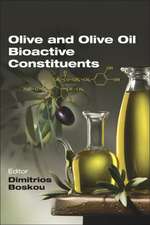Handbook of Water and Energy Management in Food Processing: Woodhead Publishing Series in Food Science, Technology and Nutrition
Editat de Jiri Klemes, Robin Smith, Jin-Kuk Kimen Limba Engleză Hardback – 29 iun 2008
Opening chapters provide an overview of key drivers for better management. Part two is concerned with assessing water and energy consumption and designing strategies for their reduction. These include auditing energy and water use, and modelling and optimisation tools for water minimisation. Part three reviews good housekeeping procedures, measurement and process control, and monitoring and intelligent support systems. Part four discusses methods to minimise energy consumption. Chapters focus on improvements in specific processes such as refrigeration, drying and heat recovery. Part five discusses water reuse and wastewater treatment in the food industry. Chapters cover water recycling, disinfection techniques, aerobic and anaerobic systems for treatment of wastewater. The final section concentrates on particular industry sectors including fresh meat and poultry, cereals, sugar, soft drinks, brewing and winemaking.
With its distinguished editors and international team of contributors, Handbook of water and energy management in food processing is a standard reference for the food industry.
- Provides an overview of key drivers for better management
- Reviews techniques for improvements in efficiency of water and energy use and waste water treatment
- Examines house keeping proceedures and measurement and process control
Din seria Woodhead Publishing Series in Food Science, Technology and Nutrition
- 15%
 Preț: 391.19 lei
Preț: 391.19 lei - 24%
 Preț: 1333.02 lei
Preț: 1333.02 lei - 24%
 Preț: 1210.03 lei
Preț: 1210.03 lei - 24%
 Preț: 946.43 lei
Preț: 946.43 lei - 9%
 Preț: 1205.99 lei
Preț: 1205.99 lei - 24%
 Preț: 1189.10 lei
Preț: 1189.10 lei - 9%
 Preț: 984.09 lei
Preț: 984.09 lei - 9%
 Preț: 1006.66 lei
Preț: 1006.66 lei - 24%
 Preț: 960.56 lei
Preț: 960.56 lei - 23%
 Preț: 1419.50 lei
Preț: 1419.50 lei - 9%
 Preț: 1206.85 lei
Preț: 1206.85 lei - 9%
 Preț: 922.07 lei
Preț: 922.07 lei - 24%
 Preț: 1192.22 lei
Preț: 1192.22 lei - 9%
 Preț: 1215.75 lei
Preț: 1215.75 lei - 24%
 Preț: 1162.37 lei
Preț: 1162.37 lei - 9%
 Preț: 950.09 lei
Preț: 950.09 lei - 24%
 Preț: 1162.62 lei
Preț: 1162.62 lei - 24%
 Preț: 801.31 lei
Preț: 801.31 lei - 27%
 Preț: 379.84 lei
Preț: 379.84 lei - 29%
 Preț: 1336.07 lei
Preț: 1336.07 lei - 24%
 Preț: 798.74 lei
Preț: 798.74 lei - 9%
 Preț: 1018.93 lei
Preț: 1018.93 lei - 24%
 Preț: 1081.43 lei
Preț: 1081.43 lei - 24%
 Preț: 1185.22 lei
Preț: 1185.22 lei - 31%
 Preț: 922.77 lei
Preț: 922.77 lei - 24%
 Preț: 1131.77 lei
Preț: 1131.77 lei - 9%
 Preț: 1277.62 lei
Preț: 1277.62 lei - 24%
 Preț: 1049.04 lei
Preț: 1049.04 lei - 24%
 Preț: 1134.60 lei
Preț: 1134.60 lei - 9%
 Preț: 1076.36 lei
Preț: 1076.36 lei - 24%
 Preț: 1158.21 lei
Preț: 1158.21 lei - 9%
 Preț: 1065.06 lei
Preț: 1065.06 lei - 9%
 Preț: 1067.39 lei
Preț: 1067.39 lei - 24%
 Preț: 812.03 lei
Preț: 812.03 lei - 9%
 Preț: 1203.13 lei
Preț: 1203.13 lei - 23%
 Preț: 1237.19 lei
Preț: 1237.19 lei - 24%
 Preț: 948.79 lei
Preț: 948.79 lei - 23%
 Preț: 1138.06 lei
Preț: 1138.06 lei - 9%
 Preț: 868.43 lei
Preț: 868.43 lei - 24%
 Preț: 871.98 lei
Preț: 871.98 lei - 20%
 Preț: 1272.59 lei
Preț: 1272.59 lei - 29%
 Preț: 1195.06 lei
Preț: 1195.06 lei - 9%
 Preț: 1045.58 lei
Preț: 1045.58 lei - 9%
 Preț: 1002.45 lei
Preț: 1002.45 lei - 9%
 Preț: 505.72 lei
Preț: 505.72 lei - 9%
 Preț: 1062.13 lei
Preț: 1062.13 lei - 24%
 Preț: 1306.94 lei
Preț: 1306.94 lei
Preț: 1635.86 lei
Preț vechi: 2124.50 lei
-23% Nou
Puncte Express: 2454
Preț estimativ în valută:
313.06€ • 339.94$ • 262.97£
313.06€ • 339.94$ • 262.97£
Carte tipărită la comandă
Livrare economică 23 aprilie-07 mai
Preluare comenzi: 021 569.72.76
Specificații
ISBN-13: 9781845691950
ISBN-10: 1845691954
Pagini: 1056
Dimensiuni: 156 x 234 x 65 mm
Greutate: 1.65 kg
Ediția:New.
Editura: ELSEVIER SCIENCE
Seria Woodhead Publishing Series in Food Science, Technology and Nutrition
ISBN-10: 1845691954
Pagini: 1056
Dimensiuni: 156 x 234 x 65 mm
Greutate: 1.65 kg
Ediția:New.
Editura: ELSEVIER SCIENCE
Seria Woodhead Publishing Series in Food Science, Technology and Nutrition
Cuprins
Part 1 Key drivers to improve water and energy management in food processing: Legislation and economic issues regarding water and energy management in food processing; Environmental and consumer issues regarding water and energy management in food processing; Towards a complex approach to waste treatment in food processing. Part 2 Assessing water and energy consumption and designing strategies for their reduction: Auditing energy and water use in the food industry; Methods to minimise water use in food processing; Methods to minimise energy use in food processing; Modelling and optimisation tools for water minimisation in the food industry; Energy management methods for the food industry; Minimising water and energy use in the batch and semicontinuous processes in the food and beverage industry; Novel methods for combined energy and water minimisation in the food industry. Part 3 Good housekeeping procedures, measurement and process control to minimise water and energy consumption: Good housekeeping procedures to improve efficiency of water use in food processing plants; Good housekeeping procedures to improve efficiency of energy use in food processing; Measurement and process control for water and energy use in the food industry; Monitoring and intelligent support systems for better water and energy management in food processing. Part 4 Methods to minimise energy consumption in food processing, retail and waste treatment: Minimising energy consumption associated with chilling, refrigerated storage and cooling systems in the food industry; Minimising energy consumption associated with drying, evaporation and related processes in the food industry; Minimising energy consumption associated with retorting; Heat recovery in the food industry; Fouling of heat transfer equipment in the food industry; Reduction of refrigeration energy consumption and environmental impacts in food retailing; Dewatering for food waste. Part 5 Water reuse and wastewater treatment in the food industry: Feedwater requirements in the food industry; Water recycling in the food industry; Advances in membrane technology for the treatment and reuse of food processing wastewater; Advances in disinfection techniques for water reuse; Advances in aerobic systems for treatment of food processing wastewater; Avances in anaerobic systems for organic pollution removal from food processing wastewater; Seafood wastewater treatment. Part 6 Water and energy minimisation in particular industry sectors: Water and energy management in the slaughterhouse; Water and energy management in poultry processing; Water and energy management in cereals processing; Water and energy management in the sugar industry; Improving energy efficiency in sugar processing; Water minimisation in the soft drinks industry; Brewing, winemaking and distilling: An overview of wastewater treatment and utilisation schemes.
Recenzii
"...this handbook is comprehensive in addressing almost all aspects of water and energy management in food processing industries, from the legislative to the technology." --Journal of Cleaner Production
"…well written, nicely produced, and provides an accessible source of up-to-date information on different techniques for water and energy conservation. …I am not aware of any other text that is so wide ranging in scope." --Journal of Cleaner Production
"…an invaluable reference to those involved in the day-to-day running of the food processing industries with an objective of properly managing energy and water usage. Although, the focus of the book is food processing, it can be used as a reference in any energy and water management course, both undergraduate as well as graduate. This book will also be useful to industrial technologists and consultants, teachers and students as well as researchers who wish to understand different methodologies for efficient water and energy management." --Journal of Cleaner Production
"…well written, nicely produced, and provides an accessible source of up-to-date information on different techniques for water and energy conservation. …I am not aware of any other text that is so wide ranging in scope." --Journal of Cleaner Production
"…an invaluable reference to those involved in the day-to-day running of the food processing industries with an objective of properly managing energy and water usage. Although, the focus of the book is food processing, it can be used as a reference in any energy and water management course, both undergraduate as well as graduate. This book will also be useful to industrial technologists and consultants, teachers and students as well as researchers who wish to understand different methodologies for efficient water and energy management." --Journal of Cleaner Production
